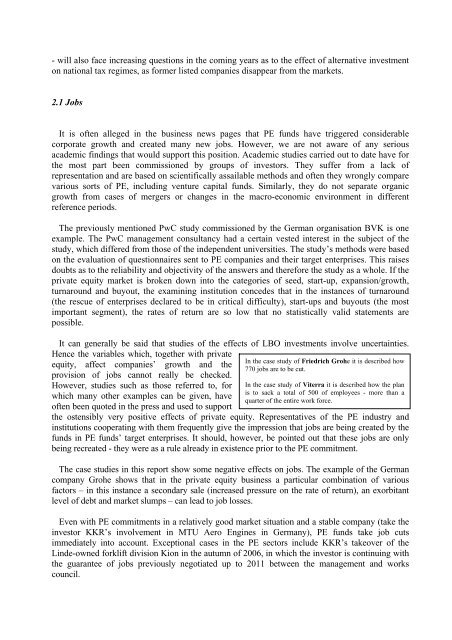Executive summary - Udo Bullmann
Executive summary - Udo Bullmann
Executive summary - Udo Bullmann
- No tags were found...
Create successful ePaper yourself
Turn your PDF publications into a flip-book with our unique Google optimized e-Paper software.
- will also face increasing questions in the coming years as to the effect of alternative investmenton national tax regimes, as former listed companies disappear from the markets.2.1 JobsIt is often alleged in the business news pages that PE funds have triggered considerablecorporate growth and created many new jobs. However, we are not aware of any seriousacademic findings that would support this position. Academic studies carried out to date have forthe most part been commissioned by groups of investors. They suffer from a lack ofrepresentation and are based on scientifically assailable methods and often they wrongly comparevarious sorts of PE, including venture capital funds. Similarly, they do not separate organicgrowth from cases of mergers or changes in the macro-economic environment in differentreference periods.The previously mentioned PwC study commissioned by the German organisation BVK is oneexample. The PwC management consultancy had a certain vested interest in the subject of thestudy, which differed from those of the independent universities. The study’s methods were basedon the evaluation of questionnaires sent to PE companies and their target enterprises. This raisesdoubts as to the reliability and objectivity of the answers and therefore the study as a whole. If theprivate equity market is broken down into the categories of seed, start-up, expansion/growth,turnaround and buyout, the examining institution concedes that in the instances of turnaround(the rescue of enterprises declared to be in critical difficulty), start-ups and buyouts (the mostimportant segment), the rates of return are so low that no statistically valid statements arepossible.It can generally be said that studies of the effects of LBO investments involve uncertainties.Hence the variables which, together with privateIn the case study of Friedrich Grohe it is described howequity, affect companies’ growth and the770 jobs are to be cut.provision of jobs cannot really be checked.However, studies such as those referred to, for In the case study of Viterra it is described how the planis to sack a total of 500 of employees - more than awhich many other examples can be given, havequarter of the entire work force.often been quoted in the press and used to supportthe ostensibly very positive effects of private equity. Representatives of the PE industry andinstitutions cooperating with them frequently give the impression that jobs are being created by thefunds in PE funds’ target enterprises. It should, however, be pointed out that these jobs are onlybeing recreated - they were as a rule already in existence prior to the PE commitment.The case studies in this report show some negative effects on jobs. The example of the Germancompany Grohe shows that in the private equity business a particular combination of variousfactors – in this instance a secondary sale (increased pressure on the rate of return), an exorbitantlevel of debt and market slumps – can lead to job losses.Even with PE commitments in a relatively good market situation and a stable company (take theinvestor KKR’s involvement in MTU Aero Engines in Germany), PE funds take job cutsimmediately into account. Exceptional cases in the PE sectors include KKR’s takeover of theLinde-owned forklift division Kion in the autumn of 2006, in which the investor is continuing withthe guarantee of jobs previously negotiated up to 2011 between the management and workscouncil.





